牛津译林版八年级英语下册各单元知识点归纳
Unit4知识归纳牛津译林版八年级英语下册
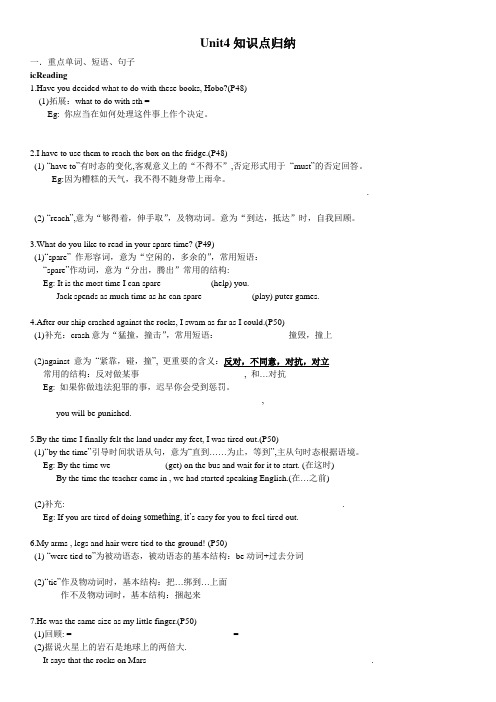
Unit4知识点归纳一.重点单词、短语、句子icReading1.Have you decided what to do with these books, Hobo?(P48)(1)拓展:what to do with sth =_______________________________Eg: 你应当在如何处理这件事上作个决定。
______________________________________________________________________2.I have to use them to reach the box on the fridge.(P48)(1) “have to”有时态的变化,客观意义上的“不得不”,否定形式用于“must”的否定回答。
Eg:因为糟糕的天气,我不得不随身带上雨伞。
_____________________________________________________________________.(2) “reach”,意为“够得着,伸手取”,及物动词。
意为“到达,抵达”时,自我回顾。
3.What do you like to read in your spare time? (P49)(1)“spare”作形容词,意为“空闲的,多余的”,常用短语:__________________________“spare”作动词,意为“分出,腾出”常用的结构:_____________________________________ Eg: It is the most time I can spare ___________(help) you.Jack spends as much time as he can spare ___________(play) puter games.4.After our ship crashed against the rocks, I swam as far as I could.(P50)(1)补充:crash意为“猛撞,撞击”,常用短语:_______________ 撞毁,撞上(2)against 意为“紧靠,碰,撞”, 更重要的含义:反对,不同意,对抗,对立常用的结构:反对做某事________________________, 和…对抗_____________________ Eg: 如果你做违法犯罪的事,迟早你会受到惩罚。
牛津译林版八年级英语下册8B Unit 4单元知识点归纳总结
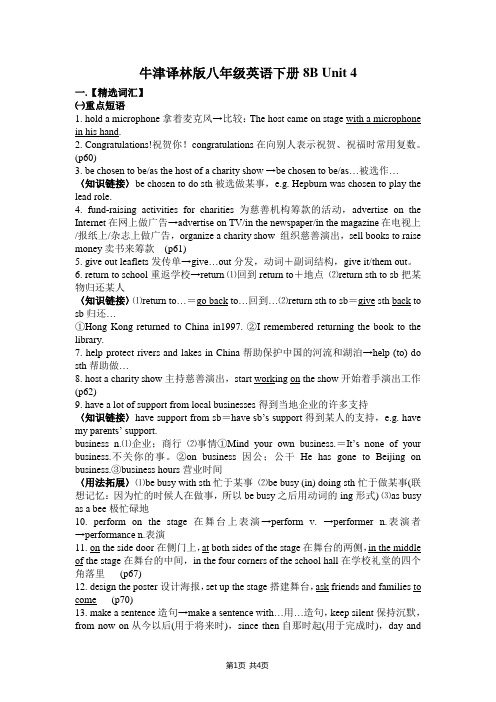
牛津译林版八年级英语下册8B Unit 4一.【精选词汇】㈠重点短语1. hold a microphone拿着麦克风→比较:The host came on stage with a microphone in his hand.2. Congratulations!祝贺你!congratulations在向别人表示祝贺、祝福时常用复数。
(p60)3. be chosen to be/as the host of a charity show →be chosen to be/as…被选作…〈知识链接〉be chosen to do sth被选做某事,e.g. Hepburn was chosen to play the lead role.4. fund-raising activities for charities为慈善机构筹款的活动,advertise on the Internet在网上做广告→advertise on TV/in the newspaper/in the magazine在电视上/报纸上/杂志上做广告,organize a charity show 组织慈善演出,sell books to raise money卖书来筹款(p61)5. give out leaflets发传单→give…out分发,动词+副词结构,give it/them out。
6. return to school重返学校→return ⑴回到return to+地点⑵return sth to sb把某物归还某人〈知识链接〉⑴return to…=go back to…回到…⑵return sth to sb=give sth back to sb归还…①Hong Kong returned to China in1997. ②I remembered returning the book to the library.7. help protect rivers and lakes in China帮助保护中国的河流和湖泊→help (to) do sth帮助做…8. host a charity show主持慈善演出,start working on the show开始着手演出工作(p62)9. have a lot of support from local businesses得到当地企业的许多支持〈知识链接〉have support from sb=have sb’s support得到某人的支持,e.g. have my parents’ support.business n.⑴企业;商行⑵事情①Mind your own business.=It’s none of your business.不关你的事。
最新牛津译林版初二英语下册知识整理共48页
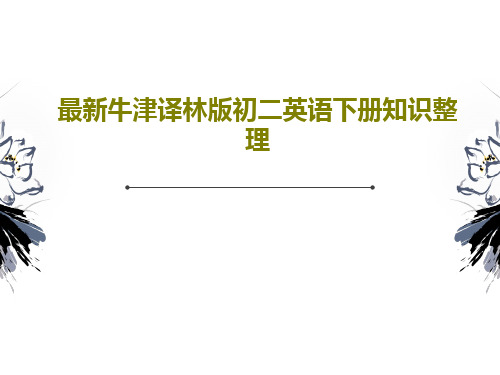
36、“不可能”这个字(法语是一个字 ),只 在愚人 的字典 中找得 到。--拿 破仑。 37、不要生气要争气,不要看破要突 破,不 要嫉妒 要欣赏 ,不要 托延要 积极, 不要心 动要行 动。 38、勤奋,机会,乐观是成功的三要 素。(注 意:传 统观念 认为勤 奋和机 会是成 功的要 素,但 是经过 统计学 和成功 人士的 分析得 出,乐 观是成 功的第 三要素 。
39、没有不老的誓言,没有不变的承 诺,踏 上旅途 ,义无 反顾。 40、对时间的价值没有没有深切认识 的人, 决不会 坚。 ——德 谟克利 特 67、今天应做的事没有做,明天再早也 是耽误 了。——裴斯 泰洛齐 68、决定一个人的一生,以及整个命运 的,只 是一瞬 之间。 ——歌 德 69、懒人无法享受休息之乐。——拉布 克 70、浪费时间是一桩大罪过。——卢梭
牛津译林版英语八年级下册笔记整理(考点1-40) PDF

8B 笔记整理(考点1 ~ 40)1. 现在完成时的信号词:2. 现在完成时的基本结构:肯定句:主语+ have / has + 过去分词否定句:主语+ have / has + not + 过去分词一般疑问句:Have / Has + 主语+ 过去分词3. used to do sth. 过去常常做某事;used to be 过去曾是…be used to doing sth. / get used to doing sth. 习惯做某事注意:观察used 前面有没有be 动词或者get / got4. Asia 亚洲Asian 亚洲的/ 亚洲人Europe 欧洲European 欧洲的/ 欧洲人Africa 非洲African 非洲的/ 欧洲人America 美洲American 美洲的/ 欧洲人* a European country 虽然元音字母开头,但是发音为辅音,所以用a* Americans and Europeans 美洲人和欧洲人; Asians and Africans 亚洲人和非洲人5. Canada 加拿大Canadian 加拿大的/ 加拿大人;Australia 澳大利亚Australian 澳大利亚的/ 澳大利亚人;Germany 德国German 德语/ 德国人的/ 德国人France 法国Fr e nc h 法语/ 法国人的/ 法国人注意:名词所有格Canadian s’ books 那些加拿大人的书the Canadian’s book 那个加拿大人的书6. ①mind doing sth.介意做某事Do you mind my opening the window? / Do you mind me opening the window?②Never mind. (口语交际)没关系,不介意③ A moment of fear went through my mind. 【名词】头脑,大脑7. 句型The best time to do sth.The best time to visit the UK is … / from … to …Sunshine Park is a wonderful place to fly kites.* 与time / place 相关的句型(表示最佳时间、最佳地点)使用to do 结构;* 短语have a good time doing sth. 使用doing 结构8. east 东方east ern东方的;west 西方west ern西方的;south 南方south ern南方的;north 北方north ern北方的;at the southern end of …在…的最南端;Western restaurants 西餐馆(表示西方文化、艺术的时候需要大写)9. can’t help / stop doing sth. 情不自禁做某事/ 忍不住做某事stop doing sth. 停止正在做的事;stop to do sth. 停下手中的事去做一件新事情10. to do 不定式表示目的(理解句意,在翻译句子的基础上理解目的的表达)We must try our best to stop the pollution to live (live) a happy life. 为了…11. be interested in doing sth. She is interested in reading novels. 对…感兴趣show an interest in doing sth. She shows an interest in reading novels.interested (感到)有兴趣的interesting 令人感兴趣的bored (感到)无聊的boring 令人感到无聊的excited (感到)兴奋的exciting 令人感到兴奋的relaxed (感到)放松的relaxing 令人放松的12. 序数词第…in the early / late twentieth century 在(第)二十世纪早/晚期区分:in the / one’s thirties 名词复数形式意思是30~39之间She is in his thirties.thirtieth 序数词意思是第三十celebrate her thirtieth birthday基数词变序数词14. hear / see sb. do sth. 听见/看见某人做事的全过程hear / see sb. doing sth. 听见/看见某人做事的一瞬间注意:经常听见或看见的是全过程I often hear the birds sing.比较级的基本结构:比较级+ than最高级的基本结构:the + 最高级16. 区分:形容词的比较级和形容词变副词* I find it easier than before to complete the task.* Susan can work out the problem easily. 轻松地解决难题副词修饰动词* 修饰比较级much / even / a little + 比较级+ than* 注意:further information / study / help …(程度)更进一步的;Further on …再往前区分:tasty = delicious 美味的;tasteful 有品味的;雅致的18. 反义词前缀un-, in-, im- 意思是not注意:读懂句意,准确判断词性,在理解句子意思的基础上补充词缀。
译林牛津八年级下册8B知识点梳理
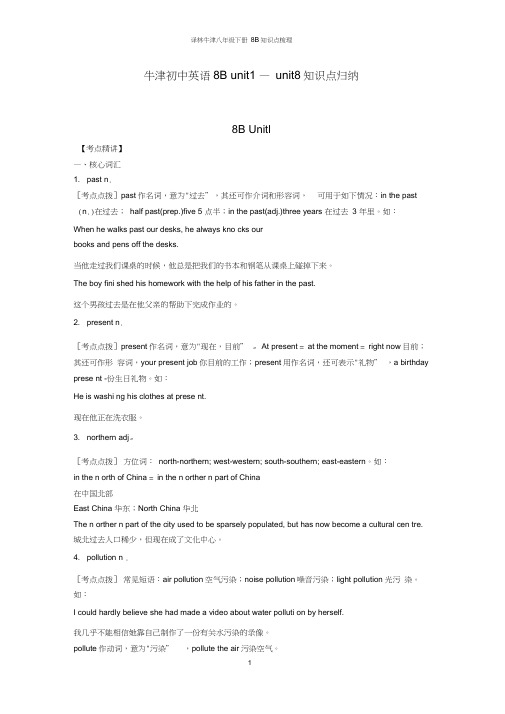
牛津初中英语8B unit1 —unit8知识点归纳8B Unitl【考点精讲】—、核心词汇1. past n.[考点点拨]past作名词,意为"过去”,其还可作介词和形容词,可用于如下情况:in the past (n.)在过去;half past(prep.)five 5 点半;in the past(adj.)three years 在过去 3 年里。
如:When he walks past our desks, he always kno cks ourbooks and pens off the desks.当他走过我们课桌的时候,他总是把我们的书本和钢笔从课桌上碰掉下来。
The boy fini shed his homework with the help of his father in the past.这个男孩过去是在他父亲的帮助下完成作业的。
2. present n.[考点点拨]present作名词,意为"现在,目前” 。
At present = at the moment = right now目前;其还可作形容词,your present job你目前的工作;present用作名词,还可表示"礼物” ,a birthday prese nt -份生日礼物。
如:He is washi ng his clothes at prese nt.现在他正在洗衣服。
3. northern adj。
[考点点拨]方位词:north-northern; west-western; south-southern; east-eastern。
如:in the n orth of China = in the n orther n part of China在中国北部East China 华东;North China 华北The n orther n part of the city used to be sparsely populated, but has now become a cultural cen tre. 城北过去人口稀少,但现在成了文化中心。
牛津译林版英语八年级下册 Unit 1 语法、词汇、句型知识点总结(详细版)

牛津译林版英语八年级下册Unit 1 语法、词汇、句型知识点总结(详细版)8B Unit 1 Past and presentComic strip & Welcome to the unit1.I've just eaten it.我刚才把它吃了。
just此处用作副词,意为“刚刚,刚才”,通常与现在完成时连用。
Mr Wang has just left our classroom.王老师刚刚离开我们的教室。
I've just heard the news.我刚听到这个消息。
拓展:①just 副词,还可意为“正好,恰好;仅仅,只是”,起加强语气的作用。
This jacket is just my size.这件夹克衫正合我的尺码。
That's just what he wanted.那正是他所要的。
He is just a child.他仅仅是一个孩子。
I just want to talk to you.我只是想和你谈谈。
①just now意为“刚才,刚刚”,相当于a moment ago,常用于句末,用于一般过去时态的句子中。
I met one of my friends in the street just now.我刚才在街上遇到了我的一个朋友。
①just then 意为“就在那时”。
Just then, someone knocked at the front door.就在那时,有人敲了敲前门。
2.Why?为什么?这是一个省略问句,其完整形式是“Why did you eat my food?”。
why引导的特殊疑问句用来询间原因,通常用because(因为)引导的句子来回答。
—Why didn't you come to the meeting yesterday?你昨天为什么没来参加会议?—Because I had a bad cold.因为我患了重感冒。
牛津译林版 八年级英语下册Unit1 重点知识点整理
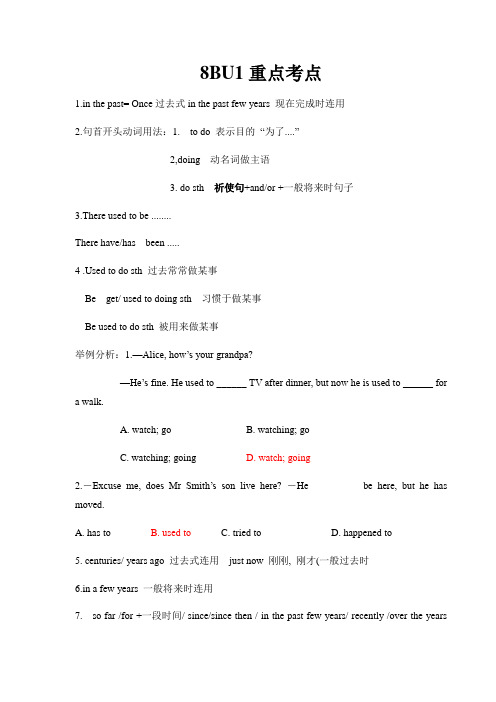
8BU1重点考点1.in the past= Once过去式in the past few years 现在完成时连用2.句首开头动词用法:1. to do 表示目的“为了....”2,doing 动名词做主语3.do sth 祈使句+and/or +一般将来时句子3.There used to be ........There have/has been .....4 .Used to do sth 过去常常做某事Be get/ used to doing sth 习惯于做某事Be used to do sth 被用来做某事举例分析:1.—Alice, how’s your grandpa?—He’s fine. He used to ______ TV after dinner, but now he is used to ______ for a walk.A. watch; goB. watching; goC. watching; goingD. watch; going2.-Excuse me, does Mr Smith’s son live here? -He _________ be here, but he has moved.A. has toB. used toC. tried toD. happened to5. centuries/ years ago 过去式连用just now 刚刚, 刚才(一般过去时6.in a few years 一般将来时连用7. so far /for +一段时间/ since/since then / in the past few years/ recently /over the years现在完成时连用8.同义句:The town has changed a lot over the years.(v.)= There have been great changes over the years. (n.)= Great changes have taken place over the years.9.On the way 在路上in some ways 在某种程度上,在一些方面In the way 挡道by the way 顺便问一下举例分析:He likes playing tricks on others, but ______, he is a good boy because he is willing to help others.A. on the wayB. in the wayC. in some waysD. by the way10.“It is / has been+时间+since+一般过去时态”句型11.“时间+has passed+since+一般过去时态”句型12.live a.....life 过着.....生活13. A marry B = A get married to B = A and B get married举例分析:Thomas Kate for two years, and they have had a child.A. got married withB. has been married toC. married toD. married14.turn…into…把…变成….turn on打开turn off关上turn up调高音量;出现turn down调低音量;拒绝turn to转向,求助于15.实现realize one’s dream =come true16.与某人交流/沟通communicate with sb17.put 构成的常用短语:①put on穿上,戴上,上演(戏剧)。
Units 1-8重要短语归纳2022-2023学年牛津译林版英语八年级下册

Unit 1 Past and presentWelcome to the unit1. past and present 过去和现在2. in the bowl 在碗里3. an hour ago 一小时前4. —Have you seen my food? 你见过我的食物吗?—Yes, I’ve just eaten it. 是的,我刚把它吃了。
5. used to share food with me 过去常常和我分享食物6. be so kind to me 对我那么好7. transport at different times 不同时代的交通工具8. by bike/ bus/ underground/ car/ taxi/ coach/ train/ plane骑自行车/乘公交车/地铁/汽车/出租车/长途汽车/火车/飞机9. Why didn’t you take a bus? 你为什么不乘公交车呢?10. too many people 太多人11. It took a long time to wait for the next bus. 花费很长时间等到下一班公交车。
12. It’s easy and fast (to go to school by bus). (乘公交车去上学)既简便又快捷。
Reading1. I’ve lived here since I was born. 我自出生就住在这里。
2. move house 搬家3. in the northern part of town 在城镇的北部4. get married 结婚5. move two blocks away 搬离两个街区6. We’ve lived in this area since then. 从那时起我们就住在这个地区了。
7. over the years 在这几年中8. turn part of the town centre into a new park 将镇中心的部分变为一个新公园9. a steel factory 一个钢厂10. put the waste into the river 将废物投入河中11. realize the problem 意识到这个问题12. take action to improve the situation 采取措施改善情况13. in some ways 在某种程度上14. move away 搬离15. know little about… 对……知道很少know nothing about…对……一无所知16. It has become impossible for us to see each other as often as before.我们已经不可能像以前那样经常见到彼此了。
- 1、下载文档前请自行甄别文档内容的完整性,平台不提供额外的编辑、内容补充、找答案等附加服务。
- 2、"仅部分预览"的文档,不可在线预览部分如存在完整性等问题,可反馈申请退款(可完整预览的文档不适用该条件!)。
- 3、如文档侵犯您的权益,请联系客服反馈,我们会尽快为您处理(人工客服工作时间:9:00-18:30)。
8B Unit 1 短语和重点句型1. repair over/ more than ten bicycles2. teach us a lot about the history of China3. the changes in Beijing4. during/in/over the past century5. learn more about Beijing’s past and present6. hear about/of…hear from sb.= receive/ get one’s letter=receive/get a letter from sb.7. living conditions8. return sth. to sb.9. make communication much easier10. go/travel/study abroad11. at primary school12. keep in touch with each other13. communicate with sb.14. take place 15. Many changes have taken place in my hometown.16. travel to and from the town by bus, taxi or train17. green hills all around18. a river runs through the centre of town19. get used to the changes of lifeget/be used to sth./ doing sth.20. many of Mr Chen’s friends21. on one’s own = by oneself = alone22. throw rubbishrubbish everywhere23. enjoy a comfortable life24. in some large open spaces25. move into new flats26. in their free time27. travel around the town28. on both sides of the street = on each side of the street29. have their own cars= have cars of their own修理超过10辆自行车教我们很多有关中国的历史北京的变化在过去一个多世纪里对北京的过去和现在了解更多听说收到某人来信居住条件把某物归还给某人使交流更方便,使得联系更容易去国外在小学互相保持联系和某人保持联系发生(有目的有计划的)(happen偶然发生) 我的家发生了许多变化。
乘汽车,出租车或火车进出小镇旅游青山环绕一条小河穿过镇中心习惯了生活的变化习惯某事/ 习惯做某事陈先生的许多朋友独自扔垃圾到处是垃圾品味舒适的生活在一些大的开阔的地方搬进新公寓在他们业余时间在镇里转转在街道两边拥有他们自己的汽车8B Unit 2 短语和重点句型在度假be on holiday2. 我以前去过那。
I have been there before.你曾经去过北京吗?Have you ever been to Beijing?去过某地(已经回来)have been to sp去了某地(还没回来)have gone to sp3. 加入某人去做某事join sb in doing sth4我正在收拾东西。
I am gett ing all my things.5来自某人写的一个故事come from a story by sb6这本书有什么特别的?What’s spec ial about this book?1. 我是如此想念你。
I miss you so much.2. 我来香港已经两个月了。
I have been in Hongkong for two months.3. 玩得特开心have a fantastic time4. 花了一整天spend the whole day5. 一个室内过山车an indoor roller coaster6. 高速运行move at high speed以……的速度at the speed of加速speed-speeded/ sped- speeded/ sped7. 全程都在尖叫大笑scream and laugh through the ride8. 匆忙去餐馆吃了份快餐hurry to a restaurant to have a quick meal9. 匆忙去某地hurry to sp (动词)/ go to sp in a hurry(名词)匆忙做某事hurry to do sth10. 见到一些迪士尼卡通人物meet some Disney cartoon characters11. 比方说such as12. 迪士尼人物的游行 a parade of Disney characters13. 跟在他们后面跑run after them14. 忍不住拍照can’t stop taking photos忍不住做某事can’t stop doing sth15. 看了一场4D电影watch a 4-D film16. 就像是魔术be like magic (名词)17. 闻到苹果馅饼的味道smell the apple pie18. 给某人买了几个钥匙扣buy a couple of key rings for sb19. 这天快要结束的时候at the end of the day20. 看烟花watch the fireworksdays.14. 去那最好的时节是在春天或秋天。
The best time to go there is in spring and autumn.15. 可能会下雨。
There may be some rain. / It may be rainy. / It may rain.16. 有一些关于五一节的计划have some plans for the May Day holiday17. 去某地出差go to sp on business18. 乘直达航班去某地take a direct flight to sp19. 坐飞机去成都要多久?How long does it take to fly to Chengdu?20. 跟我爸爸给你核实一下check it for you with my dad延续性动词表:短暂性动词延续性动词现在完成时形式leave be away ( from sp) have been away (from)borrow keep have keptbuy have have haddie be dead have been deadget married be married have been marriedjoin be in / be a member of have been in / have been a member of come back / return be back have been backgo out be out have been outreceive / get a letter / hear from have a letter have had a letteropen be open have been openclose be closed have been closedbegin/start be on have been onstop / finish/ end be over have been overmove to be in / live in have been in / have lived inget up be up have been upwake up be awake have been awakefall asleep be asleep have been asleepcatch a cold have a cold have had a coldcome / go / arrive/ reach / get to be in / at / on…have been in / at /onbegin / start to do sth do sth have done sthget to know know have knownput on wear have wornbreak down be broken have been brokenget lost / lose one’s way be lost have been lostget angry / excited be angry/ excited have been angry / excitedget worried / interested be worried / interested have been worried / interested become be have beenget used to doing sth be used to doing sth have been used to doing sth8B Unit 3 短语和重点句型【知识点讲解】1、look like 看起来像(指长相,即可指人也可指物)Eg.The man looks like our English teacher.Eg.The strange thing looks like a plate.区分:What do/dose sb. look like? 问长相=How do/does sb. look?What be sb. like? 问品质What do/does sb. like?问喜好2、chat(动词)with sb.和某人聊天have a chat(名词)with sb.chat 现在分词:cha tt ing3、send 发送send sb. sth.=send sth. to sb.把某物寄给/送给某人4、receive 收到,接到receive emails 接收邮件区分:receive 与acceptreceive 客观(被动地)收到accept 主观接受eg. I received a bunch of flower, but i didn't accept it.5、what...for?......为何目的,为何理由?=Why?eg. What did you do that for?=Why did you do that?6.click 点击click(及物动词)sth. =click(不及物动词) on sth. 点击7.thousands of 数以千计的hundred,thousand,million等表示确指时(前面有具体的数字),用单数;表泛指(前面没有数字)用复数,其后加ofeg. three thousand hundreds of8.see sb. doing sth.看见某人正在做某事eg. When i passed by the KFC, I saw many children eating hamburgers and chips in it.see sb. do sth.看见某人做了某事(强调动作发生的全过程)9.huge 形容词:巨大的区分:huge,big 和largehuge强调体型而不是重量,big指具体事物,多指体积大,还可以表示“巨大的,伟大的,重要的”等意思,其反义词是little或small,large多指面积之大、人口之多,也可表示数量(the number).10.relax 放松,休息动词三单:relaxes 形容词:relaxed 修饰人relaxing 修饰物11. be famous for +表示人或物某方面的特点、特长的词因......而出名=be known forbe famous as +职位/名称作为......而出名be famous to sb. 对于......很出名,被......所熟知eg. He is famous to the people all over the world.他被全世界的人所熟知.12.so much for sth.关于......就讲这么多,......到此为止So much for the new words.生词就学到这里。
